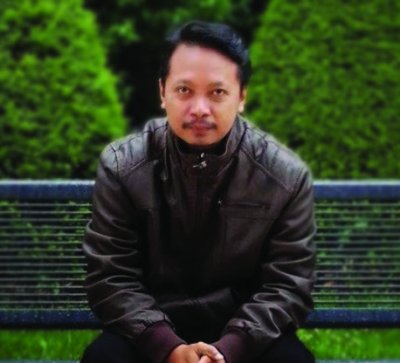Constructing Mennonite theology in Indonesia
By Danang Kristiawan, ISGA Research Fellow
 Danang Kristiawan began as a Research Fellow with the ISGA in 2021 and is passionate about contextual theological education from an Indonesian Mennonite perspective. He currently pastors a GITJ church in Jepara and teaches Anabaptist history and theology at the Mennonite seminary in Pati.
Danang Kristiawan began as a Research Fellow with the ISGA in 2021 and is passionate about contextual theological education from an Indonesian Mennonite perspective. He currently pastors a GITJ church in Jepara and teaches Anabaptist history and theology at the Mennonite seminary in Pati.
Writing our own theology is an important and necessary task for the Mennonite community in Indonesia. First, very little literature on Mennonite theology is written in Indonesian, and most congregations in Indonesia, especially in rural areas, do not speak English. Second, those books on Mennonite theology that do exist in Indonesian are all translated. So while they provide an overview of Mennonite theology, it is not a theology that was born in Indonesia and produced by Indonesians. Given these factors, I believe we urgently need to write an Indonesian Mennonite theology that can be used by lay people and congregations.
But, in practice, it is not easy to start the process. How do we define Mennonite theology? What makes a theology Mennonite? Based on what criteria? Can the theological understanding of a community that identifies as Mennonite, necessarily always be called Mennonite theology? In other words, is Mennonite theology determined by affiliation or is it determined by certain values that could be called Mennonite? Here we struggle with the tension between universality and particularity, between unity and uniquely local identities, between the global and the local.
Recently, contextual theology and decolonial approaches have brought renewed awareness to the local context. These approaches critique the assumption of universality in theology as a form of cultural hegemony; they also affirm local perspectives on culture and theology as originating from contextual struggles. This is certainly a very valuable perspective, where local experiences and context are given an equal voice in theological conversation. In this case, to write Indonesian Mennonite theology means we can write about the theology that is lived and understood by the Mennonite community in Indonesia.
Without attention to the existence of shared values in theological perspective, however, we can fall into a romanticism of particularity. Such romanticism may make us less critical of the blind spots that exist in each local culture. In addition, local identities are never separate from global influences; in the local context there are many experiences that intertwine to form identity. One example is the Javanese Mennonite community in Indonesia. Mennonites came to Java through the Dutch Mennonite Mission that arrived in 1851 and succeeded in preaching the Gospel to the Javanese people. At the same time, a local evangelist and Javanese mystic named Tunggul Wulung was teaching a Gospel that the Javanese could understand. He did not identify as a Mennonite, but later his community came under the care of a Mennonite mission.
After the Mennonite church became more mature and independent in the 1950s, local leaders studied at theological schools in the Calvinist tradition. Much of the theological literature of that time was also written and translated from Reformed theology. As a result, the influence of Calvinism has been evident in the theology, liturgy, and organization of the Javanese Mennonite community from that time until now. In the 1990s and 2000s, Pentecostal and charismatic theology developed rapidly alongside dispensational-style evangelical theology. Therefore, when the Javanese Mennonite church tried to create a doctrinal conviction as the “theological standard” of the conference in 2005, its content was strongly influenced by dispensationalism. All of these historical influences are present in the local theology that emerges in the Javanese Mennonite Church today. We can see that the local Mennonite community contains various kinds of traditions— what I could call “texts”—that form the identity of the local community.
Here I imagine that building a local Mennonite theology requires embracing the tension between particularity and universality, local identity and collective solidarity. It’s all part of a multi-textual dialogue. Building Mennonite theology in Java requires dialoguing with various interrelated texts. The first is the Gospel text as a source of inspiration. Second are local texts or experiences of community (context). In this case, Mennonite theology in Java needs to engage interreligious spiritual traditions as the context of experience. Third is the historical text of the community’s faith, including all of its shifts and struggles. Many theological traditions influence and shape the identity of a community over time; we cannot obsess over purity, because nothing is truly pure. Fourth is the text of global Mennonite tradition. Building a local Mennonite theology does not mean ignoring the long history of the Mennonite tradition, even if it comes from a different context. The Mennonite tradition can be a valuable perspective to engage in multi-textual dialogue. This dialogue needs to be carried out appreciatively, critically and with an openness to transformation.
This multi-textual dialogue process for the Javanese Mennonite community will produce an authentic theological construction, where the community’s unique history, context and experiences are considered alongside the broader Mennonite faith tradition. In this way we can fully appreciate the particularity of Javanese Mennonite faith, while also contributing to the togetherness of the global Mennonite family.





